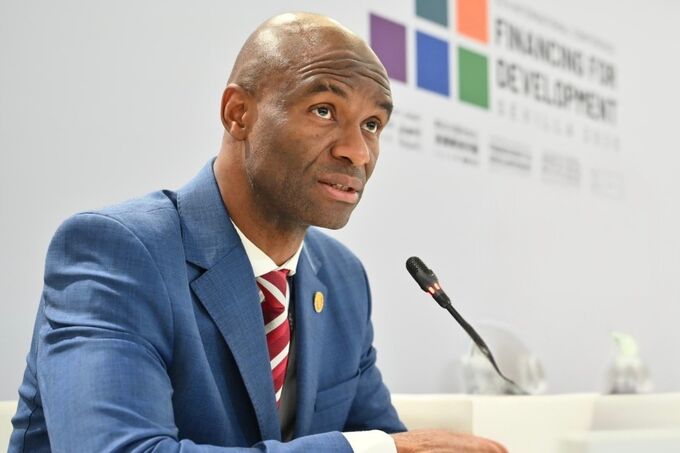
News
The Next Frontier of Africa’s Financial Integration
by Sabine F. Mensah, Deputy CEO, AfricaNenda Foundation - 1 November 2025

Africa stands at a turning point. The launch of the Instant Payment System (PI - SPI) by the Central Bank of West African States (BCEAO) is not just a technological milestone, it signals a new era in how value moves across the continent. A transaction can now cross borders in seconds, connecting communities and businesses once held back by the cost and slowness of money transfers. This acceleration could redefine Africa’s economic future.
For decades, cross-border payments have been synonymous with friction. Sending $200 to Africa still costs an average of 7.9%, according to the World Bank, more than double the 3% target set by the Sustainable Development Goals. These high costs burden small and medium-sized enterprises (MSMEs), which provide over 90% of jobs on the continent. The result is limited trade, constrained opportunity, and slower progress toward the promise of a common African market under the African Continental Free Trade Area (AfCFTA).
Yet a quiet revolution is underway. BCEAO’s PI - SPI joins the Pan-African Payment and Settlement System (PAPSS, the continental IPS), the Transactions Cleared on an Immediate Basis (TCIB, the SPO of Southern Africa), and GIMACPAY (the IPS of the Central African Interbank Group, GIMAC) in pioneering digital public infrastructure that makes cross-border payments faster, cheaper, and more inclusive. According to AfricaNenda’s State of Inclusive Instant Payment Systems (SIIPS) 2024 Report, 31 instant payment systems (IPS) are already active across Africa, three of which enable cross-border payments in real time. The momentum is real and growing.
Enhancing cross-border payments will have a transformative impact, not only on financial inclusion but also on intra-African trade, MSME competitiveness, and economic growth. This is not merely technology or data exchange standards; it is about unlocking prosperity for all. The AfCFTA offers a once-in-a-generation opportunity to fuel intra-African trade as a driver of sustainable development. For trade to happen, somebody needs to pay, and somebody needs to be paid. It is urgent that retail cross-border payments become instant, affordable, and accessible for individuals and MSMEs alike.
Africa’s leadership in mobile technology has already shown the way. A basic mobile phone has become a powerful gateway to financial inclusion: 40% of African adults now own a mobile money account according to the 2025 Findex. Banks, mobile money operators, remittance companies, and fintechs are increasingly offering cross-border payment solutions. But these remain fragmented, interbank transactions can still take days to settle, and fees remain too high.
The biggest obstacles are regulatory and institutional frictions. Licensing regimes vary widely, compliance rules are inconsistent, and approval timelines can stretch to three years. For fintechs driving innovation at the national level, scaling across borders remains a costly and uncertain journey. It is time to remove these bottlenecks.
To achieve true financial integration, Africa needs a continental approach:
- A fintech license passporting regime to accelerate the expansion of cross-border payment solutions providers beyond national borders,
- Harmonized e-KYC and AML/CFT standards (Anti-Money Laundering and Countering the Financing of Terrorism), to ensure more safety, speed and transparency, and
- A Pan-African Payment Services Directive (PSDA), inspired by Europe’s PSD2 and PSD3, providing unified guidelines for seamless cross-border payment services across Africa.
This transformation is already taking shape. The AfCFTA’s Protocol on Digital Trade provides the policy foundation. The G20 roadmap on cross-border payments offers a global framework for efficiency and transparency. Together, they align with Africa’s own ambition: to make payments faster, cheaper, safer, and more inclusive.
At AfricaNenda Foundation, we work with central banks, policymakers, IPS operators, and financial inclusion advocates to turn this ambition into reality. We support governments in designing and scaling inclusive instant payment systems (IIPS) through technical assistance, capacity building, and data-driven insights. We foster peer learning, benchmarking, and ecosystem strengthening to ensure that IIPS reach everyone, from small businesses and farmers to women entrepreneurs.
Moving beyond cash is not just an efficiency gain; it is a path to empowerment. Inclusive instant payment systems give women greater financial autonomy, help MSMEs expand, and enable rural communities to participate fully in national and regional markets. They are the invisible infrastructure behind a more dynamic, resilient, and self-sustaining African economy.
Our vision is bold but achievable: by 2030, over 260 million more Africans should have access to affordable instant payment systems. Achieving this will require a unified policy and regulatory framework that enables “all-to-all interoperability”, linking bank accounts to wallets, wallets to banks, and instant payment systems across borders.
Encouraging progress is already visible. The BCEAO has set the pace, the Bank of Central African States (BEAC) is already charting its path, Southern Africa Development Community (SADC) is interconnecting systems, and East African countries are piloting bilateral linkages. These initiatives, once interconnected, will define the early architecture of an African payments market fit for the 21st century.
As we prepare to launch the SIIPS 2025 Report, we invite all financial ecosystem stakeholders to join this movement. The insights we uncover on progress, barriers, and opportunities, will serve as a roadmap to accelerate Africa’s journey toward a truly inclusive digital economy.
Africa has never lacked ingenuity. It has always turned constraints into innovation. The BCEAO PI - SPI is not the end of that story, it is the beginning of a new chapter: one where Africa takes control of its flows, its value, and its economic destiny.


